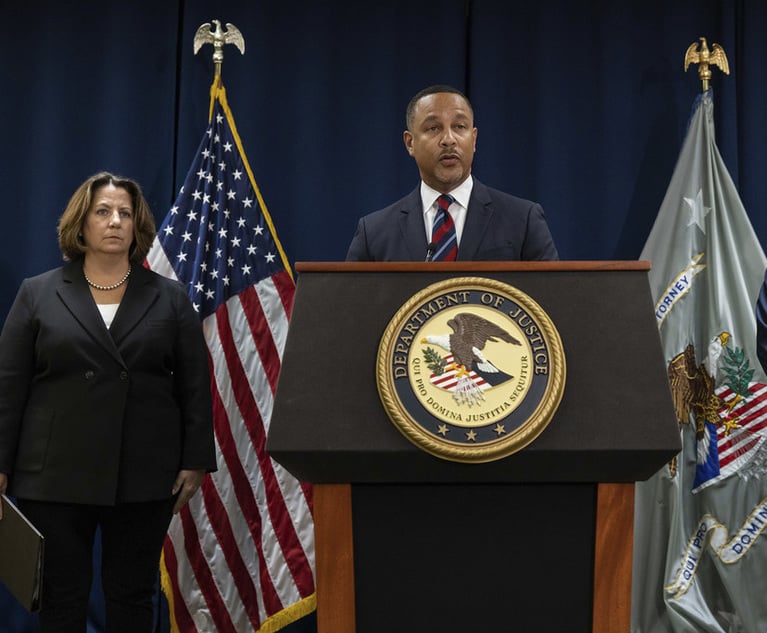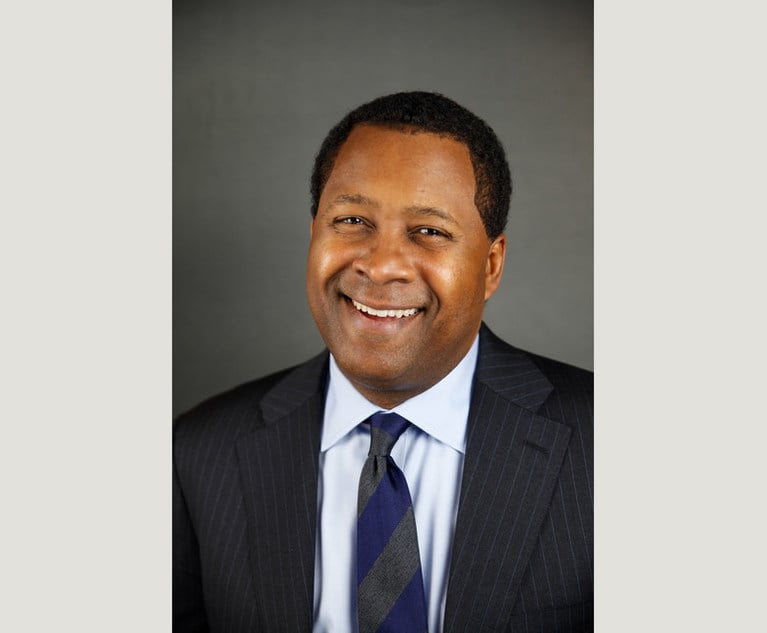Compliance Hot Spots: 6 Things We're Watching in the New Year | FBI Is 'Beefing Up' in FARA | Headlines: FTC Ordered to Pay Legal Fees; DOJ Incentivises Compliance | Who Got the Work
Welcome to Compliance Hot Spots -- and happy 2020. We're spotlighting some case and enforcement developments on our radar for the new year, and scroll down for year-end headlines and more. Thanks for reading!
January 02, 2020 at 09:00 PM
12 minute read
Welcome to Compliance Hot Spots—and happy New Year. Where did 2019 go? 2020 will be a big year for many reasons—and we've highlighted, below, some of the things we're tracking. If you missed it, check out our reporting on the FBI's new role in FARA inquiries. Plus, a few year-end roundup links. Scroll down for Who Got the Work, and much more. Thanks for reading!
Tips, feedback and thoughts on trends and your practice are always appreciated. Contact C. Ryan Barber at [email protected] and 202-828-0315, and follow him on Twitter @cryanbarber.

6 Things We're Watching in the New Year
>> Antitrust cases against Big Tech—will anything come to fruition? "Amid all the big talk about investigations and recriminations, legal experts and politicians interviewed by MarketWatch expect that the status quo will continue in 2020, at least until the presidential election in November," according to a Market Watch report.
>> Proposed changes to SEC whistleblower regulations remain up in the air. The agency has appeared to pause moving forward—at least for now—a proposal that could limit some of the larger awards. "The proposed provision was not a 'cap'—it could not and was not intended to operate as a 'cap,' and I do not support a cap," SEC Chairman Jay Clayton (above) said in November. "Congress vested in the Commission the authority and responsibility to use our good judgment and experience to determine award amounts within the range of 10-30% prescribed by Congress, and we should do just that." Plaintiff-side whistleblower lawyer Stephen Kohn has a pending FOIA request exploring whether and how there was any outside influence into how the proposal first came about.
>> The Huawei case will drag out in Brooklyn federal court—whether or not Sidley Austin's James Cole, the former deputy U.S. attorney general, is a part of the defense team. Cole was disqualified from the case over an unspecified investigation from his tenure at Main Justice, and we are watching out for new filings in just a few days about what prompted the government's move to block him from the case. Huawei continues to be represented in the case by Jenner & Block partner David Bitkower and Sidley Austin partner Michael Levy. Prosecutors have charged Huawei in an alleged scheme to circumvent U.S. sanctions against Iran.
>> Carlos Ghosn, formerly the head of Nissan Motor Co., is now a fugitive after fleeing Japan. "Carlos Ghosn's stunning escape from Japan makes him one of the most famous white-collar fugitives in recent years, joining the likes of Malaysian businessman Jho Low and Indian tycoon Vijay Mallya," Bloomberg reports. Ghosn issued a new statement Thursday denying his family played any role in his departure from Japan, where he faced claims of financial misconduct.
>> Where will Rod Rosenstein land? The former deputy U.S. attorney general has largely remained out of the public's eye for months now, ever since he left the leadership post after the Mueller report was released. Rosenstein's a career prosecutor, but he could be a big catch for a white-collar and investigations practice or working in-house at a major US company. Mark your calendar: Rosenstein's set to speak at ALM's Legalweek conference in New York in early February.
>> The fallout from the special counsel investigation will continue. The Justice Department's ordered to make various disclosures this month in the Foreign Intelligence Surveillance Court over an inspector report that showed missteps in the early stages of the Russia investigation. Plus, former Trump national security adviser Michael Flynn will face a judge for sentencing on Jan. 28. Prosecutors appear to be reconsidering their past support for leniency and will give their recommendation on Jan. 6. Calendar watch: In April, the Russian firm Concord Management and Consulting is set to go to trial in Washington on charges it took part in a scheme to interfere in the 2016 election. Reed Smith partner Eric Dubelier is a lead defense attorney for Concord.
Meanwhile, here's a recap of white-collar and Justice Department headlines from 2019: A 'Never Trump' Tale, DOJ Is Strained & Katie Porter's Stumpers: 12 Memorable White-Collar Stories. And over at Compliance Week, there's a roundup of some of the year's biggest compliance fails. Check it out here. Bloomberg Law has a report on some big white-collar things they're watching in 2020, including the Elizabeth Holmes trial and a sanctions fight involving Exxon Mobil Corp.

'They're Beefing Up': FBI Takes Expanded Role in 'Foreign Agent' Reviews
Amid the greater scrutiny of foreign influence in the United States, the FBI has taken an expanded role in efforts to ensure lawyers, lobbyists and political consultants are fully revealing their advocacy for government clients, a move that observers said brings a new intensity to compliance reviews that have traditionally been handled by Justice Department staff.
This year, FBI personnel began joining Justice Department officials in inspections authorized under the Foreign Agents Registration Act, or FARA, a decades-old law requiring the disclosure of lobbying and other influence work for foreign governments. FARA enforcement ramped up over the past three years, as part of the special counsel's investigation of Russia's interference in the 2016 presidential election.
Lawyers, lobbyists and other advocates are required to file reports detailing their work for foreign interests and allow the Justice Department to review records related to those engagements. The inspections—generally conducted by officials from the Justice Department's FARA unit at the offices of registered foreign agents—are meant to assess not only whether disclosures are fulsome but also whether firms are complying with FARA's record-retention requirements.
The FBI has long taken part in investigations of foreign lobbying, coordinating with national security officials at Main Justice. With the FBI's entry into inspections, the Justice Department's FARA unit is "getting teeth" in compliance reviews targeting those who have already registered as foreign agents, said Melissa Laurenza, a partner at Akin Gump Strauss Hauer & Feld who advises clients on FARA.
"They're beefing up," Laurenza said. "I think, going forward, we're going to see them be more aggressive. I think we're going to see more activity out of them than we've seen in the past."

Who Got the Work
>> Andrew Ceresney (above), a Debevoise & Plimpton partner who previously served as the Securities and Exchange Commission's enforcement director, advised MetLife as the company reached a $10 million settlement with the SEC over accounting errors. "Investors are entitled to the reliability and accuracy of financial information," said Marc P. Berger, director of the SEC's regional office in New York. "The commission found that MetLife's insufficient internal controls caused longstanding accounting errors." Read more here at WSJ.
>> A divided Second Circuit this week upheld various wire-fraud convictions tied to an alleged insider-trading scheme anchored to information at the Centers for Medicare & Medicaid Services. The appeals court concluded that "confidential government information such as the CMS information at issue here may constitute 'property' in the hands of the government for purposes of the wire fraud and Title 18 securities fraud statutes." Munger Tolles partner Donald Verrilli Jr. argued for one of the defendants. Assistant U.S. attorney Sarah Eddy argued for the government. Wilmer Cutler Pickering Hale and Dorr represented the National Association of Criminal Defense Lawyers as an amicus party. O'Melveny & Myers represented a group of law professors as amici. Read the decision here.
>> Steptoe & Johnson LLP partner Edward Krauland has joined the team defending Huawei against charges it violated U.S. sanctions against Iran, just weeks after a federal judge disqualified Sidley Austin partner James Cole from the case over a purported conflict of interest stemming from his tenure as deputy attorney general under the Obama administration. Krauland, an expert on sanctions, adds firepower to a lineup of top white-collar defense lawyers from Sidley Austin, including Tom Green and Mark Hopson, the head of the firm's Washington office.
>> Sidley Austin's Stephen Cohen represented broker-dealer Critical Trading LLC in a recent settlement with the SEC over alleged violations of the "short tender rule." Antonia Chion, associate director of the SEC's enforcement division, said in a statement: "The commission's short tender rule is designed to provide fairness for all participants in partial tender offers. We will continue to police these opportunities where market participants can enrich themselves by gaining an unfair advantage at the expense of others."

Compliance Corner: What We're Reading
Courts and cases
FTC Is Ordered to Pay $843K in Legal Fees, Costs After Losing Privacy Case. The Federal Trade Commission must pay more than $843,000 in attorney fees and costs to the law firms that represented a now-defunct medical diagnostic testing company that had long argued the agency was misguided in an enforcement action alleging inadequate data-privacy protections. Atlanta-based LabMD, which has claimed the FTC's enforcement action put it out of business, was represented by firms including Ropes & Gray, Dinsmore & Shohl, and Wilson Elser Moskowitz Edelman & Dicker. A team from Ropes & Gray served pro bono as lead counsel for LabMD in the U.S. Court of Appeals for the Eleventh Circuit, which last year ruled against the FTC. [NLJ]
At SCOTUS, Business Groups and Lawmakers Cast Doubt on DOJ's Proposed Easy Fix for CFPB. "All of the other amici that addressed a remedy argued, like Seila, that the Supreme Court cannot just remove the allegedly unconstitutional provision to make the CFPB director accountable to the president. Many amici, including the CFPB targets Harpeth Financial and RD Legal, emphasized that the Supreme Court would be defying Congressional intent if it were to effectively give the president control of the CFPB." [Reuters]
US Justice Department
How the Justice Department Incentivizes Companies to Invest in Compliance. "Some chief compliance officers are still skeptical that the Justice Department has the expertise or resources to meaningfully assess the work they do—or a genuine interest in crediting companies for it if they run afoul of the law. Matt Miner, a deputy assistant attorney general overseeing the department's criminal division, wants to convince them otherwise." [WSJ]
How a Top Antitrust Official Helped T-Mobile and Sprint Merge. "As the $26 billion blockbuster merger between T-Mobile and Sprint teetered this summer, Makan Delrahim (at left), the head of the Justice Department's antitrust division, labored to rescue it behind the scenes, according to text messages revealed this week in a lawsuit to block the deal." [NYT]
Treasury and SEC
Treasury's Financial Crimes Unit Ramps Up Foreign Targeting, Investigations. "U.S. financial institutions may be required to provide more customer information to the Treasury Department's financial crimes office as it ramps up its focus on foreign money-laundering threats. The Treasury's Financial Crimes Enforcement Network this year established a new division to oversee foreign and domestic investigations. The Global Investigations Division, created in August, was previously part of FinCEN's enforcement office." [WSJ]
SEC's Latest Extractive Industry Rule Seeks to Lighten Compliance Burden. "By carving out exceptions to the disclosure rule and softening key definitions, however, the SEC now faces stiff opposition from the nongovernmental organizations and anticorruption groups that lobbied to have the requirement added to Dodd-Frank." [WSJ]
U.S. Regulator to Put the Spotlight on Audit Quality in 2020. "In the year ahead, the board intends to advance at least two new proposals: one rule governing audit firms' approach to quality control and another creating a permanent program for the inspections of broker-dealers." [WSJ]
Revolving door
Pat Cipollone, Gene Scalia, Chris Landau & More: The Year in Financial Disclosures. A number of prominent lawyers jumped into the Trump administration in 2019, revealing their clients and recent income in the process. Here's a recap of the year that was in financial disclosures, featuring Labor Secretary Eugene Scalia, a former GIbson, Dunn & Crutcher partner, and White House counsel Pat Cipollone. [NLJ]

Notable Moves and Announcements
>> FTC Chair Joseph Simons announced recently that Ian Conner will lead the competition bureau as director effective December 20. Conner has served as a Deputy Director of the Bureau of Competition since September 2017, when he joined the agency from Kirkland & Ellis. Simons said in October that Bruce Hoffman was leaving his post as director of the bureau of competition.
>> Global blockchain payments provider BitPay has hired Eden Doniger as general counsel and chief compliance officer. She is the Atlanta-based firm's first top lawyer. Doniger most recently served as assistant general counsel for Cox Enterprises Inc.
>> Susan Nash, an associate director in the SEC's asset management division, has stepped down after a three-decade career at the commission. Announcing her departure, the SEC described Nash as an "architect of disclosure policy for mutual funds, variable annuities, and other investment companies." SEC Chairman Jay Clayton said: "Susan has served America's Main Street investors and our markets very well. She has a thorough appreciation for the information needs of investors, and a keen understanding of the interconnections across different sectors of the financial services industry."
This content has been archived. It is available through our partners, LexisNexis® and Bloomberg Law.
To view this content, please continue to their sites.
Not a Lexis Subscriber?
Subscribe Now
Not a Bloomberg Law Subscriber?
Subscribe Now
NOT FOR REPRINT
© 2025 ALM Global, LLC, All Rights Reserved. Request academic re-use from www.copyright.com. All other uses, submit a request to [email protected]. For more information visit Asset & Logo Licensing.
You Might Like
View All
Compliance Hot Spots: GOP Eyes ESG as an Antitrust Issue + Another DOJ Crypto Seizure + Sidley Partner Jumps to Main Justice
9 minute read
Compliance Hot Spots: Lessons from Lafarge + Fraud Section Chief Talks Compliance + Cravath Lands FTC Commissioner
11 minute readLaw Firms Mentioned
Trending Stories
- 1Arguing Class Actions: With Friends Like These...
- 2How Some Elite Law Firms Are Growing Equity Partner Ranks Faster Than Others
- 3Fried Frank Partner Leaves for Paul Hastings to Start Tech Transactions Practice
- 4Stradley Ronon Welcomes Insurance Team From Mintz
- 5Weil Adds Acting Director of SEC Enforcement, Continuing Government Hiring Streak
Who Got The Work
J. Brugh Lower of Gibbons has entered an appearance for industrial equipment supplier Devco Corporation in a pending trademark infringement lawsuit. The suit, accusing the defendant of selling knock-off Graco products, was filed Dec. 18 in New Jersey District Court by Rivkin Radler on behalf of Graco Inc. and Graco Minnesota. The case, assigned to U.S. District Judge Zahid N. Quraishi, is 3:24-cv-11294, Graco Inc. et al v. Devco Corporation.
Who Got The Work
Rebecca Maller-Stein and Kent A. Yalowitz of Arnold & Porter Kaye Scholer have entered their appearances for Hanaco Venture Capital and its executives, Lior Prosor and David Frankel, in a pending securities lawsuit. The action, filed on Dec. 24 in New York Southern District Court by Zell, Aron & Co. on behalf of Goldeneye Advisors, accuses the defendants of negligently and fraudulently managing the plaintiff's $1 million investment. The case, assigned to U.S. District Judge Vernon S. Broderick, is 1:24-cv-09918, Goldeneye Advisors, LLC v. Hanaco Venture Capital, Ltd. et al.
Who Got The Work
Attorneys from A&O Shearman has stepped in as defense counsel for Toronto-Dominion Bank and other defendants in a pending securities class action. The suit, filed Dec. 11 in New York Southern District Court by Bleichmar Fonti & Auld, accuses the defendants of concealing the bank's 'pervasive' deficiencies in regards to its compliance with the Bank Secrecy Act and the quality of its anti-money laundering controls. The case, assigned to U.S. District Judge Arun Subramanian, is 1:24-cv-09445, Gonzalez v. The Toronto-Dominion Bank et al.
Who Got The Work
Crown Castle International, a Pennsylvania company providing shared communications infrastructure, has turned to Luke D. Wolf of Gordon Rees Scully Mansukhani to fend off a pending breach-of-contract lawsuit. The court action, filed Nov. 25 in Michigan Eastern District Court by Hooper Hathaway PC on behalf of The Town Residences LLC, accuses Crown Castle of failing to transfer approximately $30,000 in utility payments from T-Mobile in breach of a roof-top lease and assignment agreement. The case, assigned to U.S. District Judge Susan K. Declercq, is 2:24-cv-13131, The Town Residences LLC v. T-Mobile US, Inc. et al.
Who Got The Work
Wilfred P. Coronato and Daniel M. Schwartz of McCarter & English have stepped in as defense counsel to Electrolux Home Products Inc. in a pending product liability lawsuit. The court action, filed Nov. 26 in New York Eastern District Court by Poulos Lopiccolo PC and Nagel Rice LLP on behalf of David Stern, alleges that the defendant's refrigerators’ drawers and shelving repeatedly break and fall apart within months after purchase. The case, assigned to U.S. District Judge Joan M. Azrack, is 2:24-cv-08204, Stern v. Electrolux Home Products, Inc.
Featured Firms
Law Offices of Gary Martin Hays & Associates, P.C.
(470) 294-1674
Law Offices of Mark E. Salomone
(857) 444-6468
Smith & Hassler
(713) 739-1250










